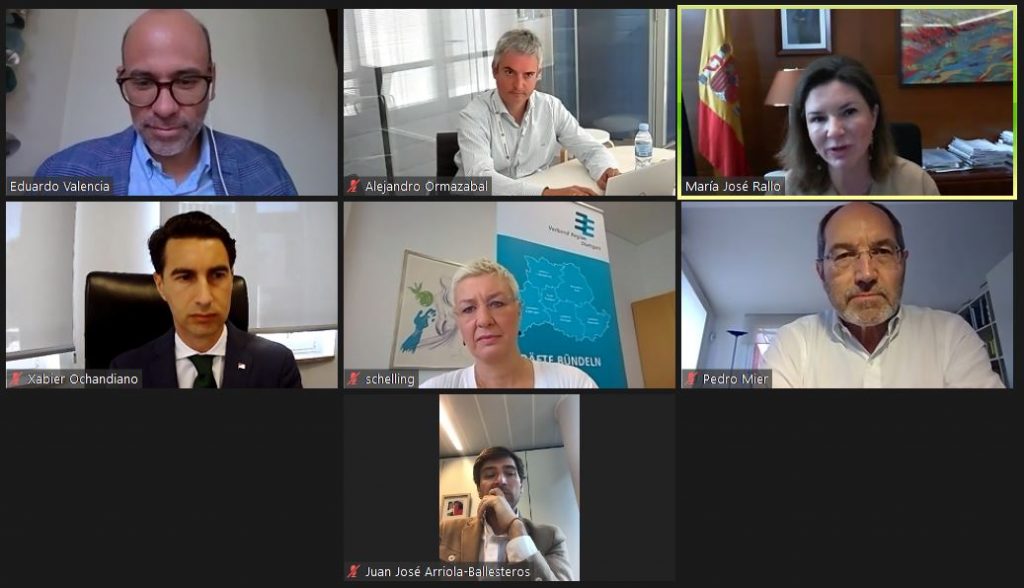Last week, Alejandro Ormazabal, Vice President of Velatia, participated in the third edition of the Think Tank #VEHICLES7YFN, organised by Ametic, and which also included a presentation by Jorge González, CEO of Ormazabal, on the challenges that e-mobility poses for the electrical network
More than 50 experts met last week to discuss the key points to the mobility ecosystem in the future during the third edition of #VEHICLES7YFN, the Think Tank organised by Ametic, the digital industry’s association, on 30 June and 1 July. This forum, an international benchmark in e-mobility, aimed to highlight the current and future situation of the electric vehicle and the autonomous vehicle in the context of the economic and social crisis caused by the COVID-19 pandemic, as well as the challenges that this technological disruption will bring for transport and electrical network infrastructures.
The meeting was organised in two main blocks, the first corresponding to the institutional opening committee and the debate table, and the second referring to the private work sessions.
Key issues such as logistics improvements in digital supply networks, investment in an electrical network ready for this new scenario, 5G connectivity possibilities and communications infrastructures were addressed by the different participants, including Alejandro Ormazabal, Vice President of Velatia, and Jorge González, CEO of Ormazabal.
The Vice-President of Velatia wanted to enhance an initiative of this kind, which has led to the generation of “the multi-sector environment of trust needed to collaboratively address the challenges and opportunities in the transformation of European industry”.
Furthermore, Alejandro Ormazabal stressed that the importance of the Think Tank lies in “grounding the mobility innovation ecosystem in specific opportunities for European industry for a common multi-sector challenge in which automotive, electrical energy and petrochemical agents must converge”.
A European industry that will have to adapt to these decarbonisation trends in the economy, since, in the words of Jorge González, Ormazabal’s CEO, “the adaptation of sustainable mobility combined with a way out of the crisis with a more electrified economy, is based on the digitalisation of the electrical network as a more sustainable innovative commitment in Europe”.
Thus, González offered an optimistic view during the #VEHICLES7YFN Think Tank, as “the European Union’s plan for green energy for all Europeans not only remains in force after the COVID-19 pandemic, but rather it is focusing on this vector as one of the opportunities to maintain the fiscal stimulus for the reactivation of the economy”. This is repeated in Spain, where “the wind is blowing in the direction in which the institutions are 100% backing the use of this energy or ecological transition as a vector of economic revival”.
Ormazabal’s CEO also mentioned the great opportunity that electrical and autonomous mobility represents for economic recovery. “We must seize this moment to generate quality, technology-based and local employment”, he said.
With regard to the emergence of electric vehicles, which is still unequal across European regions, Jorge González wanted to highlight the fundamental role of public institutions, since “there will be no widespread adoption of electric vehicles until the appropriate political decisions are made to promote a well-distributed fast and ultra-fast recharging network that puts an end to users’ fears”.
Lastly, Ormazabal’s CEO highlighted that a short-term scenario in which renewable energies converge in the electrical network, intermittently, with distributed storage systems and new uses for a more electrified economy together with the introduction of the electric vehicle “implies that we must make a very strong investment in the electrical network to extend it, as well as automate and digitalise it”.
These interventions, along with those of the other speakers, will soon appear as conclusions in a document of recommendations for the ecosystem and for public administration.
About VEHICLES7YFN Think Tank
#VEHICLES7YFN has a multi-sector organisation led by Ametic and backed by the international consulting firm Normann Partners, its third edition was held this year via in digital format due to the circumstances caused by COVID-19. Despite this, the forum is a benchmark regarding electric and autonomous vehicles and received the collaboration of the Ministry of Transport, Mobility and Urban Agenda, Bilbao Ekintza, Biscay Provincial Council Bizkaiko Foru Aldundia, Stuttgart Economic Development Agency, Barcelona City Council , Catalan Agency for Business Competitiveness ACCIÒ, as well as prestigious European organisations, such as EIT Urban Mobility, ITU, ETSI, UNE, ESA, DIGITALEUROPE, benchmark centres like AIC-Automotive Intelligence Center, Orkestra-Basque Institute of Competitiveness, CIC energiGUNE, CTAG, CTTC, Bilbao Metropoli-30, TECNALIA Research & Innovation, Eurecat – Catalonia Technology Centre , Vicomtech, Mobile World Capital Observatorio Nacional 5G, Aedive, ANFAC, MAFEX, Spanish Railway Association, SERNAUTO and ONCE Foundation.
Some of the companies that actively participate in this forum are EMT Madrid, Velatia, Grupo Antolin, Gertek, Iberdrola, IBIL, IKUSI, Ormazabal, Kapsch Group, Premo Group, Porsche AG, Bombardier Transportation, Cabify, CAF, Cepsa, Ferrovial, Saba, SIMON, Thyssenkrup and Whitehole, among others.




